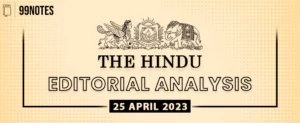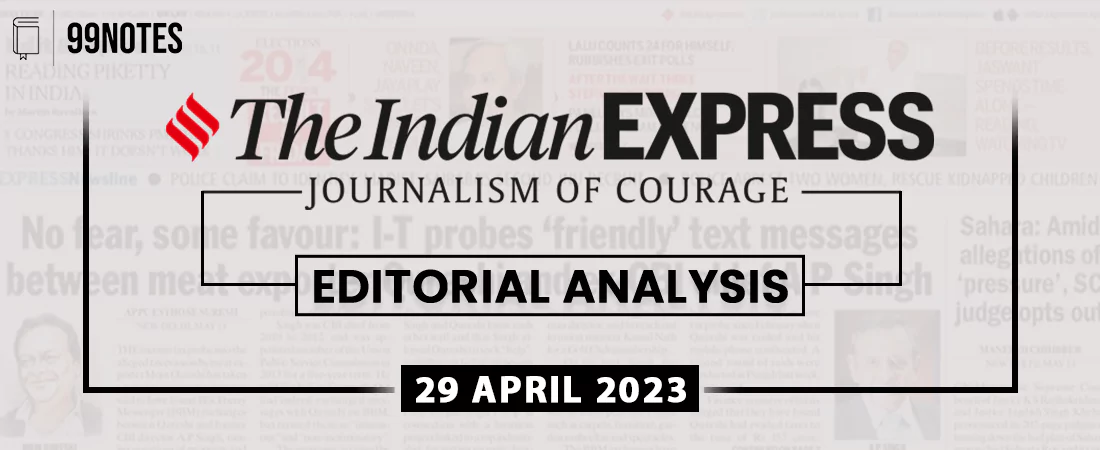29 April 2024 : Indian Express Editorial Analysis
Indian Express Editorial Analysis
29-April-2024
1. FOR FUTURE READY SENIORS
| Topic: GS2 – Social Justice – Vulnerable sections
GS2 – Governance – Government policies – Interventions for development in various sectors This topic is relevant for both Prelims and Mains in the context of understanding demographic shifts, particularly the aging population. |
| Context: |
|
Implications for Health and Social Care Systems:
- The decreasing household size in India, from 5.94 in 2011 to 3.54 in 2021, coupled with a growing number of older people who may suffer from chronic illnesses, necessitates a reset of the health and social care system.
- As families become smaller and older, there’s a growing concern about providing care for seniors at home.
- This shift poses challenges as it blurs the lines between social care and health care, necessitating external assistance in caring for older individuals at home.
Evolving Home-Based Care Practices:
- The scope of services provided at home has expanded significantly, ranging from assistance with daily activities to routine nursing care and specialized care.
- According to a NITI Aayog report, healthcare offered at home has the potential to replace up to 65% of unnecessary hospital visits and reduce hospital costs by 20%.
- However, care practices at home lack standardization, and well-trained caregivers with an empathetic outlook are in short supply.
Policy Interventions Needed:
To better organize care at home, several policy interventions are necessary.
- Firstly, there is a need to recognize “home” as a place for providing care and as a “place of work” for caregivers, which has implications for the rights and safety of both users and providers.
- Secondly, the terms of engagement and treatment protocols for home-based care must be tailored to the home environment.
- Thirdly, there is a need to streamline vocational training for caregivers and establish clear career progression pathways.
- Finally, comprehensive policies on home-based care should encompass aspects such as provider registries, transparency, accountability, grievance redressal mechanisms, and insurance coverage.
Addressing Gender Disparities:
- The policy should also address gender disparities, as women in India tend to outlive men by three years on average.
- With the sex ratio of older people projected to increase, particularly among older single women, the policy should cater to their specific needs to ensure they can live respectable and independent lives.
Role of Government Ministries and Legislative Efforts:
- The Ministry of Health and Family Welfare (MoHFW), Ministry of Social Justice and Empowerment (MSJE), and Ministry of Skill Development and Entrepreneurship (MSDE) have pivotal roles in addressing the challenges of an aging population.
- Greater collaboration among these ministries could facilitate necessary reforms.
- Additionally, legislative efforts such as the Maintenance and Welfare of Parents and Senior Citizens (Amendment) Bill, 2019, seek to regulate home-based care for older people but have yet to be passed.
Balancing Focus on Youth and Older Population:
- While efforts to make India’s youth population “future-ready” are important, equal attention should be given to the aging population.
- Learning from countries like Japan, where systems to care for older people are integral for economic productivity, emphasizes the importance of addressing the needs of older individuals as a societal responsibility.
- This reciprocal care acknowledges their lifetime contributions to society and reflects moral and ethical values.
| What are the Problems Associated with the Ageing Population? |
Social:
|
| PYQ: Performance of welfare schemes that are implemented for vulnerable sections is not so effective due to absence of their awareness and active involvement at all stages of policy process – Discuss. (250 words/15m) (UPSC CSE (M) GS-2 2019) |
| Practice Question: Discuss the challenges and policy implications of India’s rapidly aging population, highlighting the need for comprehensive reforms in the healthcare and social welfare sectors. (250 words/15 m) |
2. Healing the soil
| Topic: GS3 – Environment
This topic is relevant for both Prelims and Mains as the examination of soil degradation, groundwater depletion, loss of biodiversity, and their implications for climate resilience sheds light on pressing environmental challenges facing India and the world. |
| Context: |
|
Evolution of Global Environmental Agreements:
- Over the past 50 years, numerous Conference of Parties (COPs) have convened, with the latest being COP28 in Dubai, UAE, in 2023.
- Notably, COP28 incorporated agriculture into its agenda, marking a significant development.
- However, India refrained from signing the agreement, citing concerns over potential changes in agricultural policies and practices.
Population Growth and Agricultural Practices:
- The exponential growth of the human population has intensified demands for food production, leading to widespread biodiversity loss.
- The rapid increase in population size, from two billion to over eight billion within a century, has necessitated extensive agricultural practices, often at the expense of natural habitats and ecosystems.
Impact of Agricultural Innovations:
- The Green Revolution, characterized by high-yielding varieties, irrigation, and chemical inputs, revolutionized global agriculture by significantly increasing food production.
- However, this intensive agricultural model has also contributed to environmental degradation, including loss of biodiversity and soil health.
Need for Policy Reforms:
- Existing policies, such as heavy subsidies on chemical fertilizers, have exacerbated environmental degradation by promoting unsustainable farming practices.
- Soil degradation, groundwater depletion, and loss of crop diversity underscore the urgent need for policy reforms to prioritize both farmer welfare and environmental sustainability.
Ecological Consequences of Policy Decisions
- Unsustainable agricultural policies, such as free power for irrigation and open-ended procurement of specific crops, have led to ecological disasters in regions like Punjab, Haryana, and Rajasthan.
- Rampant groundwater exploitation and monocropping practices have further exacerbated environmental challenges, including carbon emissions and loss of biodiversity.
Urgency for Change and Climate Resilience
- India, with its disproportionate population density and limited natural resources, faces immense pressure on its soils, water, air quality, and biodiversity.
- Urgent policy interventions are needed to transition towards sustainable farming practices, mitigate greenhouse gas emissions, and restore ecological balance to ensure climate resilience and sustainable livelihoods.
Conclusion:
- As climate change accelerates and extreme weather events become more frequent, the need for transformative policy measures becomes increasingly urgent.
- By adopting farmer-centric and planet-positive policies, India can mitigate environmental degradation, ensure food security, and safeguard the well-being of future generations.
- The time for action is now, and concerted efforts are essential to address the complex challenges facing India’s agricultural and environmental sectors.
| Soils Degradation: Impact of Erosion on Fertility |
|
| PYQ: Why did the Green Revolution in India virtually by-pass the eastern region despite fertile soil and good availability of water? (150 words/10m) (UPSC CSE (M) GS-1 2014) |
| Practice Question: Discuss the challenges posed by unsustainable agricultural practices and policies to India’s environmental sustainability and food security. Evaluate the implications of global environmental agreements on India’s agricultural sector and its stance on international commitments. (250 words/15 m) |
For Enquiry

29 April 2024 : Indian Express Editorial Analysis

Sub Inspector Salary per month in India- Check other Perks & Allowance also

27 April 2024 : Daily Current Affairs Quiz

27 April 2024 : Daily Answer Writing

27 April 2024 : The Hindu Editorial Notes PDF

27 April 2024 : Daily Current Affairs

27 April 2024 : PIB Summary for UPSC

27 April 2024 : Indian Express Editorial Analysis

26 April 2024 : Daily Current Affairs Quiz

26 April 2024 : Daily Answer Writing
April 2024 Indian Express 29 April 2024 : Indian Express Editorial Analysis Indian Express Editorial Analysis
29-April-2024
1. FOR FUTURE READY SENIORS
Topic: GS2 – Social Justice…
Blogs Upsc Sub Inspector Salary per month in India- Check other Perks & Allowance also Sub Inspector Salary – The starting salary of a police sub-inspector in India can vary from state…
Daily Quiz 27 April 2024 : Daily Current Affairs Quiz 27- April 2024 : Daily Quiz…
mains answer writing 27 April 2024 : Daily Answer Writing Mains Answer Writing
27-April-2024
Q1) Describe the functioning of the Public Distribution System (PDS)…
April 2024 The Hindu Editorial 27 April 2024 : The Hindu Editorial Notes PDF The Hindu EDITORIAL
27-April-2024
1. Sounding the gavel on curative jurisdiction
Topic: GS2 – Indian…
April 2024 Daily Current Affairs 27 April 2024 : Daily Current Affairs Daily Current Affairs
27-April -2024- Top News of the Day
1. SC seeks EC reply on petition for fresh…
April 2024 PIB 27 April 2024 : PIB Summary for UPSC PIB Summary for UPSC
27-April-2024
1. SCO Defence Ministers’ Meeting in Kazakhstan endorses ‘One Earth,…
April 2024 Indian Express 27 April 2024 : Indian Express Editorial Analysis Indian Express Editorial Analysis
27-April-2024
1. ROBUST AND TRANSPARENT
Topic: GS2 – Governance…
Daily Quiz 26 April 2024 : Daily Current Affairs Quiz 26- April 2024 : Daily Quiz…
mains answer writing 26 April 2024 : Daily Answer Writing Mains Answer Writing
26-April-2024
Q1) Discuss the multifaceted significance of the fisheries sector…



